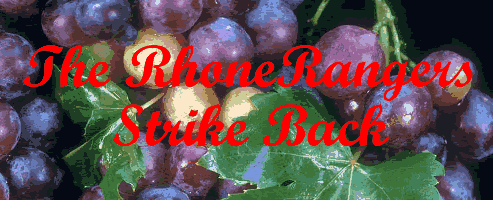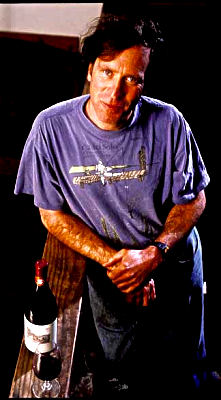
By Liz Garone
Was that a "Hi-ho, Silver!" I heard? Well, not exactly. But yes, the Ranger is back. Only this time, he's calling himself the Rhone Ranger, and far from combatting crime, his interests run instead, to promoting wine. You can expect him soon at a liquor store or a restaurant near you. Heck, he's probably already there under a variety of names.
The so-called Rhone Rangers are a maverick crew of California winemakers who bucked the Cabernet Sauvignon-Chardonnay trend back in the early 1980s and began experimenting with Rhone-style wines. Encouraged by his experimental batches of Rhone varietals, Rhone Ranger pioneer Randall Grahm of Bonny Doon Vineyards in the Santa Cruz mountains, released the premier vintage of Le Cigare Volant in 1986. Grahm, who has received accolades for his work in popularizing Rhone-style wines in California, is also the only Rhone Ranger known to actually don the ranger's signature crimson-colored mask and matching neckerchief. He even has a "Rhoneranger" asteroid named after him.
But whatever their marketing methods, the Rangers' mission is the same: to get the word out about different varieties of Rhone wines being produced up and down the California coast.

"There's no doubt that we'd like to see more people drinking Rhone varietals," said Bob Lindquist, owner of the Qupé winery, 45 minutes south of San Luis Obispo. Qupé is pronounced "Kwoo pay" and is the Chumash Indian word for California's state flower, the golden poppy. Lindquist, one of the original members of the Rhone Rangers, has been creating Rhones ever since he was turned on to a Syrah, a heady, fruity red Rhone, back in 1982.
Lindquist produces four different varieties of Syrah, with suggested retail prices ranging from $14 to $40 a bottle, which puts them in the premium wine category. What makes them premium is not only the use of quality grapes but also Lindquist's attention to detail in the winemaking process.
And, old world methods.
"I call it a 'handmade' approach to how the wines are made," said Lindquist, who, like most of the Rangers, works only in small batches and with open-top compressors. All of Lindquist's wines are aged in traditional-style French oak barrels.
Some 60 percent of the 20,000 cases of wine Lindquist produces each year are Syrah. Another 20 percent of his production is in Chardonnay, and the rest is in other Rhone varietals. According to Lindquist, of the 21 Rhones on the Ranger list, Syrah is the most popular. Still, it has little of the name recognition of today's hot sellers, like Merlot and Zinfandel.
One reason for this could be some name mix-ups. Browsing a store shelf or a restaurant wine list, you might see Syrah, Petite Syrah, Shiraz, or all three. It turns out that Petite Syrah is made from grapes unrelated to those used for Syrah, and that ''Shiraz'' is the Australian word for Syrah. Hence, the confusion.
Lindquist isn't worried, though.
"Ten years ago, nobody knew Merlot. Fifteen to 20 years ago, nobody knew Chardonnay," he said. "The great grapes, they always rise to the top. And Syrah is one of them." Lindquist is so convinced of Syrah's potential that he plans to increase its production by 4-6,000 cases over the next five years.
Still, he realizes that it could be some time before the Rhone varietals really catch on.
"There isn't a lot of quantity yet, but the potential is there," he said. "It might take five, 10 years, but it will happen."
The complete Rhone list includes 21 different grape varieties, but the eight main Rhones grown in the United States are Carignane, Cinsault, Grenache, Mourvedre, Marsanne, Roussanne, Syrah, and Viognier.
Steve Waters, head buyer for John Walker & Company in San Francisco, doesn't expect Rhones to eclipse Cabernet and Chardonnay anytime soon. But he also believes that the Rangers and their Rhones have an excellent opportunity to penetrate a shifting market.
"For most of the nineties, Cabernet and Chardonnay have ruled," said Waters. "But people get sick of the same wines. It (the wine market) has opened up recently for Rhone Rangers to do their thing."
More access to wine information, whether on the Web or through outreach programs like the Rhone Rangers, combined with a strong economy, has created a more sophisticated and educated wine consumer, according to Waters.
"We might be looking at the next boom (in wine)," he said.

If this article has whetted your appetite for Rhone wine, you might want to check out this year's Millennium Rhone Rangers Tasting on Saturday, March 25, at Fort Mason's Herbst Pavilion in San Francisco. General admission tickets are $35 in advance and $40 at the door. Tickets may be purchased at the Fort Mason Box Office or by calling (415)441-3687.